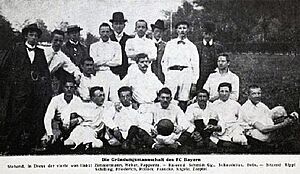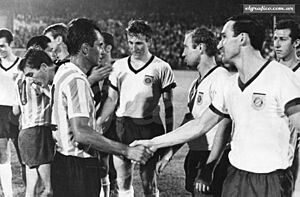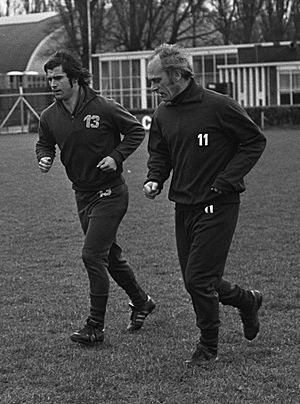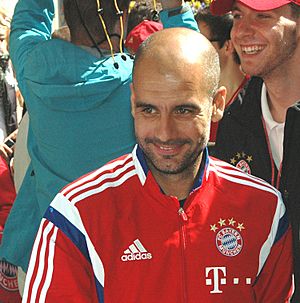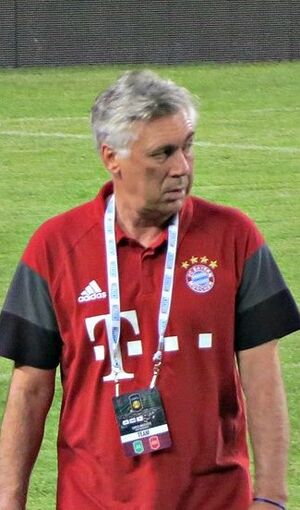History of FC Bayern Munich facts for kids
FC Bayern Munich is a famous German sports club from Munich, Bavaria. It's best known for its amazing football team. This team plays in the Bundesliga, which is the top football league in Germany. Bayern is the most successful club in German football history! They have won a record 30 national titles and 20 national cups.
The club was started in 1900 by eleven football players, led by Franz John. Bayern had a "golden age" in the mid-1970s. Back then, with Franz Beckenbauer as their captain, they won the European Cup three times in a row (1974–76). Overall, Bayern has reached the European Cup/Champions League final eleven times. They most recently won their sixth title in 2020. This win was part of a "treble," meaning they won three big trophies in one season! Bayern has also won the UEFA Cup, European Cup Winners' Cup, UEFA Super Cup, FIFA Club World Cup, and two Intercontinental Cups. This makes them one of the most successful European clubs in the world. Since the Bundesliga started, Bayern has been the strongest team in Germany, winning 29 titles and 10 of the last 13.
Contents
- Early Years and Challenges
- Building a Stronger Team (1946–1962)
- Bundesliga Beginnings
- The Golden Years
- Success in the 1980s
- New Millennium Success
- Historic Treble (2012–13)
- The Pep Guardiola Era
- Continued Success in Germany
- The Sextuple (Six Trophies)
- Ten Straight League Titles
- Images for kids
- See also
Early Years and Challenges
FC Bayern was formed in 1900. A group of football fans left another club because the gymnasts there weren't very excited about football. From the start, Bayern was a strong team in their local area.
To get better facilities and for money reasons, they joined with other clubs twice. In 1906, they teamed up with Münchner Sport Club. As part of this, Bayern changed their team colors from black to red and white, which they still wear today. Bayern won their first title, the Bavarian league championship, in 1909. After World War I, in 1919, Bayern left MSC and later joined Turn- und Sportverein 1890 Jahn München. They became independent in 1923 and have been on their own ever since.
In those early days, football in Bavaria was mostly won by teams from the north, like 1. FC Nürnberg and SpVgg Greuther Fürth. Bayern's President, Kurt Landauer, who led the club for many years, wanted to challenge this. He hired William Townley, an English coach, to help build a stronger team.
In 1926, Bayern won the South German Championship. Then, in 1931, their local rivals 1860 München became the first team from Munich to reach the national final. Just a year later, Bayern went one better! They won the German Championship in 1932, beating Eintracht Frankfurt 2–0 in the final. This was a huge win for the club.
However, the rise of the Hitler regime brought tough times for Bayern. President Landauer, who was Jewish, had to leave the club. The team faced difficulties because of its past connections. The last recorded football match during this period was a derby between Bayern and 1860 München on 23 April 1945.
Building a Stronger Team (1946–1962)
After World War II, Bayern played in the Oberliga Süd. This was one of five top leagues in West Germany. From 1947 until the professional league, the Bundesliga, started in 1963, Bayern was a middle-of-the-road team. They finished third or fourth at best. They even got sent down to the second division in 1956, which is the only time that has happened.
But Bayern did have some success in cup competitions. They won the German Cup in 1957, which was only their second national trophy. In 1962, Bayern played their first European match in the Inter-Cities Fairs Cup. They beat Basel 3–0 but were later knocked out by Dinamo Zagreb.
Bundesliga Beginnings
In the 1963–64 season, Germany's top football league became one national league called the Bundesliga. Before this, it was split into five regional divisions.
Bayern was disappointed at first because their rivals, 1860 München, joined the new league instead of them. Bayern's new president, Wilhelm Neudecker, hired Zlatko Čajkovski, a famous coach. He built a strong team with talented young players like goalkeeper Sepp Maier, Franz Beckenbauer, and Gerd Müller. These players would become known as "the axis" of the team. After missing out on promotion in 1964, Bayern won their league in 1965 and joined the Bundesliga.
The team was very young, with an average age of 22. They immediately finished third in the league. More importantly, they won the Cup final against MSV Duisburg 4–2. This win allowed them to play in the UEFA Cup Winners' Cup in Europe.
The team's biggest star was 20-year-old Franz Beckenbauer. He played in the 1966 FIFA World Cup in England and became famous worldwide. He was even voted third best player in Europe!
The next season, Bayern won the German Cup again, beating Hamburger SV 4–0. The biggest highlight was winning the Cup Winners' Cup in Nuremberg. They beat Rangers 1–0 in extra time, with a goal from Franz Roth. Roth would go on to score many important goals for Bayern in cup finals.
In the 1967–68 season, another coach, Branko Zebec, took over. He made the team play a more disciplined style. This paid off when Bayern won the 1968–69 Championship and the Cup, achieving their first "double" (winning both the league and cup) in Bundesliga history. They did this using only 13 players all season!
Borussia Mönchengladbach, who were promoted to the Bundesliga at the same time as Bayern, became big rivals. They won the next two championships. Bayern's president then brought in Udo Lattek as coach. In his first year, he won the Cup. With new young players like Paul Breitner and Uli Hoeneß, he built a team that won the German Championship three times in a row, a first in history!
The Golden Years
In the last match of the 1971–72 season, Bayern secured their return to the top of German football with a 5–1 win against Schalke 04. This was also Bayern's first official match in the new Olympic Stadium. The stadium was full with 80,000 fans, bringing in a lot of money for the club.
The Olympic Stadium was considered one of the most beautiful stadiums in the world. This new stadium greatly increased Bayern's income. It helped Bayern keep their best players, unlike rivals like Borussia Mönchengladbach.
When Spain allowed foreign players again in 1973, Bayern turned down a huge offer for Gerd Müller from Barcelona. Meanwhile, Mönchengladbach sold their star player Günter Netzer to Real Madrid. Bayern also bought Jupp Kapellmann for a record fee.
The year 1972 was amazing for Bayern. They won the championship, breaking many records. Six Bayern players were also part of the West Germany national team that won the European Championship. This showed how strong Bayern had become. They defended their title the next year, proving their dominance.
In 1974, Bayern won their third championship in a row. They also became the first German team to win the European Cup. In the final, Georg Schwarzenbeck scored a surprise goal from far away in the last minute of extra time against Atlético Madrid, making it a draw. In the replay two days later, Uli Hoeneß and Gerd Müller each scored two goals, and Bayern easily won the Cup.
Six Bayern players were also on the West German team that won the World Cup final that same year against the Netherlands. The next season, the team wasn't as motivated in the national league. But under coach Dettmar Cramer, they still won big in Europe. In 1975, they beat Leeds United in the Champions Cup final in Paris. Franz Roth and Gerd Müller scored late goals to defend the Cup. Bayern then set a new record: they were the only Champions Cup winner to have a losing record in their national league in the same season. A year later, in Glasgow, they beat Saint-Étienne with another goal by Roth. Bayern became the third team to win the trophy three years in a row!
The Intercontinental Cup finals in December 1976 marked the end of this golden era. Bayern won again, beating Brazilian club Cruzeiro. Soon after, Beckenbauer and Müller left for the United States. Sepp Maier's career ended due to a car accident after he had played in every game for 13 seasons, a world record at the time. Bayern needed to start fresh.
Success in the 1980s
After a period without much success, the team didn't want Max Merkel as their new coach. This led to President Neudecker, who had done so much for the club, stepping down.
Pál Csernai, who had been an assistant coach, became the new head coach. He changed Bayern's playing style. When Paul Breitner returned to the club, he formed a great partnership with Karl-Heinz Rummenigge. This duo, along with goalkeeper Jean-Marie Pfaff, Klaus Augenthaler, and striker Dieter Hoeneß, brought success back to Munich. They won two championships and a cup. However, their dream of another European Cup was stopped in the final against Aston Villa. This was Bayern's first official final loss after 12 undefeated final appearances.
Csernai's time ended, and Udo Lattek returned as coach. Despite some money problems, he delivered. Bayern won the cup in 1984 in a penalty shootout, the first in the competition's history.
After Rummenigge moved to Internazionale for a world record transfer fee, Bayern had money but lost its superstars. Still, the new team won another cup (as part of a "double") and five championships in six years, including their second hat-trick of titles. This meant they finally passed 1. FC Nürnberg as record holders for most German titles. But they lost another European Cup final in 1987 to Porto.
Jupp Heynckes became the new coach. After a season without titles, Lothar Matthäus and Andreas Brehme left for Internazionale. Despite losing key players, Bayern won two more championships in the next couple of years. However, two seasons without any trophies led to Heynckes losing his job.
Søren Lerby became manager, but his time was a disaster. Bayern almost got relegated in 1992, and they were knocked out of the UEFA Cup badly. Erich Ribbeck took over and, with Franz Beckenbauer as director, managed to keep the club safe from relegation.
Bayern didn't want to repeat the 1991–92 disaster. They spent a lot of money on new players like Thomas Helmer, Jorginho, and Lothar Matthäus. They also signed Mehmet Scholl. They sold Stefan Effenberg and Brian Laudrup to balance the books. The rebuilt team almost won the title but just missed out. Ribbeck's tactics were blamed, and Beckenbauer took over as coach himself. Bayern immediately improved and won the title that year.
"Kaiser Franz" (Beckenbauer) became president, and Giovanni Trapattoni was hired as the first Italian coach. Trapattoni was respected, but communication issues caused problems. After a sixth-place finish, Trapattoni returned to Italy. Otto Rehhagel became manager, but he also left due to disagreements. Beckenbauer again stepped in and led the club to win the 1996 UEFA Cup Final against Bordeaux. Jürgen Klinsmann scored a record 15 goals in Bayern's European journey, helping them win their first European trophy in 20 years.
Trapattoni returned as coach, now speaking German well. He immediately won a championship, followed by a cup win the next season, before returning to Italy again.
New Millennium Success
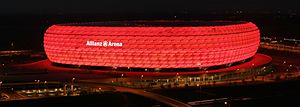
The next six years were incredibly successful for Bayern. Ottmar Hitzfeld became one of the most successful German and European coaches.
In his first season in 1999, Bayern won the league title. But the most memorable moment was the Champions League Final in Barcelona. Bayern led early and controlled most of the game. However, Manchester United scored two goals in stoppage time to win! Bayern also lost the national cup final two weeks later.
The next season, Bayern got their revenge by beating Bremen 3–0 in the cup final, achieving their third "double." In Europe, the team, led by goalkeeper Oliver Kahn, midfielder Stefan Effenberg, and striker Giovane Élber, reached the semi-finals of the Champions League.
In 2001, after 25 years, the European Cup finally returned to Munich! Bayern beat Manchester United in the quarter-finals and Real Madrid in the semi-finals. In the final in Milan, they beat Valencia in a penalty shootout (1–1; 5–4 in penalties). Oliver Kahn was the hero, saving three penalties. Bayern also won the national championship just days earlier. They stayed ahead of Schalke 04 with a goal in the very last second of the season, winning their third title in a row.
The next season, Bayern couldn't win a fourth straight Bundesliga title or the cup. They lost to Real Madrid in the Champions League quarter-finals. However, they did win the Intercontinental Cup in Tokyo against Boca Juniors.
National glory returned in 2002–03 when Bayern won its fourth "double." They won the Bundesliga by a huge margin and beat 1. FC Kaiserslautern 3–1 in the cup final. But they had a very bad Champions League campaign, getting knocked out in the first group stage without a single win. The next season, even with new striker Roy Makaay, Bayern struggled. They were knocked out of the Champions League by Real Madrid and lost in the cup to a second-division team.
After this, Hitzfeld left, and Felix Magath became coach. In his first year, he led the club to another "double."
In 2005–06, Bayern moved from the Olympic Stadium to the new Allianz Arena. The club owns this stadium with local rivals 1860 München. Bayern has won most of their matches there, and fans love it. They celebrated another national "double" in their new home. However, they lost badly to Milan in the Champions League. Key players like Michael Ballack also left the club.
For the 2006–07 season, Bayern brought in new players like Lukas Podolski, Daniel Van Buyten, and Mark van Bommel. Van Bommel became an important leader for the team. After a poor start to the season, Magath was sacked, and Ottmar Hitzfeld returned. He couldn't turn the season around enough to qualify for the Champions League, so Bayern played in the 2007–08 UEFA Cup.
For the 2007–08 season, Bayern made big changes. They signed Miroslav Klose, Luca Toni, and Franck Ribéry. Ribéry cost a club record fee of €25 million. Other players like Owen Hargreaves, Claudio Pizarro, and Roy Makaay left.
These changes worked immediately! Bayern dominated the Bundesliga, losing only twice and setting a record for fewest goals conceded. They also won another "double" by beating Borussia Dortmund in the cup final. Ribéry was voted Germany's Footballer of the Year, and Toni was the league's top scorer with 24 goals. However, Bayern was knocked out of the UEFA Cup in the semi-finals by Zenit Saint Petersburg.
The 2008–09 season saw former Bayern star Jürgen Klinsmann take over as coach. Long-time goalkeeper and captain Oliver Kahn retired. The team had mixed results in the league but did well in the Champions League, beating Sporting CP 12–1 over two games. However, they lost badly to Barcelona 0–4 in the next round. Klinsmann was sacked, and Jupp Heynckes returned to secure second place in the league.
Before the 2009–10 season, Bayern made more big changes. They hired Dutch coach Louis van Gaal and signed strikers Arjen Robben and Mario Gómez. Long-time manager Uli Hoeneß became the club president. After a slow start, the team improved greatly. Led by a brilliant Robben, Bayern won both domestic titles (league and cup) and reached the Champions League final in Madrid. They lost to Internazionale, but it was still Bayern's most successful season in almost ten years.
For the 2010–11 season, Bayern didn't sign many new players. They had many injuries, especially to Robben. The team started very poorly in the league, falling far behind Borussia Dortmund. They finished fifth in the first half of the season. Bayern performed better in the second half but couldn't catch Dortmund. In the Champions League, they lost to Internazionale. Van Gaal was sacked, and assistant coach Andries Jonker took over, securing third place and a Champions League spot.
In the 2011–12 Champions League campaign, Bayern reached the final after beating Real Madrid in a penalty shootout. But they lost the final to Chelsea, also in a penalty shootout.
Historic Treble (2012–13)
In the 2012–13 season, Bayern reached their third European final in four years. They famously crushed Barcelona 7–0 over two games in the semi-finals. On 25 May 2013, with a late goal from Arjen Robben, they beat Borussia Dortmund 2–1 at Wembley Stadium to win their fifth European Cup title. This was their first European title in 12 years. One week later, on 1 June 2013, Jupp Heynckes, in his last match, led Bayern to a 3–2 victory over VfB Stuttgart in the German Cup final. This secured a historic "treble" for Bayern, as they had already won the Bundesliga eight weeks earlier.
The Pep Guardiola Era
After Bayern Munich's historic treble, the club hired Pep Guardiola as their new manager. Guardiola had also coached Barcelona to a treble before. His first game was a loss to Borussia Dortmund in the German Supercup. However, Bayern quickly won the UEFA Supercup and the FIFA Club World Cup in Guardiola's first season. They also won the Bundesliga in March, setting a new record for the earliest title win. Despite winning the Bundesliga with a record 29 wins, Bayern were knocked out of the Champions League semi-finals by Real Madrid, losing 5–0 over two games. After this setback, Bayern bounced back and won the German Cup, securing their second "domestic double" in a row.
For the 2014/15 season, Bayern signed Dortmund striker Robert Lewandowski. They lost the German Supercup to Dortmund and couldn't win the German Cup again. They also lost in the Champions League semi-finals to Barcelona. However, they did win their third Bundesliga title in a row.
In Pep Guardiola's final season, Bayern Munich won their fourth Bundesliga title in a row. They also set a record for the fewest goals conceded in a Bundesliga season (17). But they failed to win the Champions League again, losing to Atletico Madrid. They did win the German Cup against rivals Borussia Dortmund. Guardiola then left to join Manchester City.
Continued Success in Germany
Bayern Munich appointed Carlo Ancelotti to replace Guardiola for the 2016–17 season. His first game was a 2–0 win over Borussia Dortmund in the German Supercup. Bayern Munich won their fifth straight league title that season. Ancelotti led Bayern to the Champions League quarter-finals, but they were knocked out by Real Madrid. Bayern also lost to Dortmund in the German Cup.
In the 2017/18 season, Ancelotti led Bayern to another German Supercup title, again beating Borussia Dortmund. However, after a 3–0 loss to Paris Saint Germain in the Champions League and a poor start in the Bundesliga, Ancelotti was sacked in September 2017. Jupp Heynckes returned for his fourth time as coach. Success immediately followed! Bayern won the league by 21 points and reached the Champions League semi-finals. But they were again knocked out by Real Madrid. Heynckes retired after the season, even though the club wanted him to stay.
Bayern Munich appointed Niko Kovač as manager. Bayern had a rocky start in the Bundesliga but then went on a good run. They won their seventh straight Bundesliga title after a 5–1 win over Frankfurt in the final match. In the Champions League, they were knocked out by Liverpool. Bayern won the "domestic double" that season by winning the German Cup final.
The Sextuple (Six Trophies)
Despite beating Tottenham Hotspur 7–2 in the Champions League, Bayern had a slow start to the 2019–20 season. This led to a big 5–1 loss to Eintracht Frankfurt. Kovač was dismissed after this defeat, and assistant coach Hansi Flick took over. Flick's time started well with three wins, including a 4–0 win over Borussia Dortmund. After two losses, the team went on an amazing unbeaten streak until the COVID-19 pandemic stopped football. When the Bundesliga restarted in May 2020, Bayern won all their remaining games to successfully defend their "double."
The Champions League restarted in August as a single-game tournament in Lisbon. Bayern made history by beating Barcelona 8–2 in the quarter-finals! They then beat Lyon and Paris Saint-Germain to win their sixth European Cup. This completed their second "continental treble" (league, national cup, and Champions League).
Bayern then went on to win both the German and European Super Cups, and the Club World Cup. This completed the "sextuple," meaning they won six trophies in one year! They were only the second team in history to do this, after Pep Guardiola's Barcelona in 2009.
Ten Straight League Titles
The 2020-21 season had a surprise when Bayern were knocked out of the German Cup by second-division team Holstein Kiel. But this was just a small bump. The team went on to win another Bundesliga title, their ninth in a row! Hansi Flick left Bayern after the season to coach the German national team. Julian Nagelsmann was appointed in his place.
Nagelsmann's Bayern won their first trophy by beating Borussia Dortmund in the German Supercup. Although Bayern were unsuccessful in the German Cup again, losing 0–5 to Borussia Mönchengladbach, and were surprisingly knocked out of the Champions League by Villarreal, they made history by winning their tenth consecutive Bundesliga title. By doing this, they became the first team in Europe's top five leagues to win their domestic league ten years in a row!
Images for kids
See also
 In Spanish: Historia del Bayern de Múnich para niños
In Spanish: Historia del Bayern de Múnich para niños
 | Janet Taylor Pickett |
 | Synthia Saint James |
 | Howardena Pindell |
 | Faith Ringgold |


